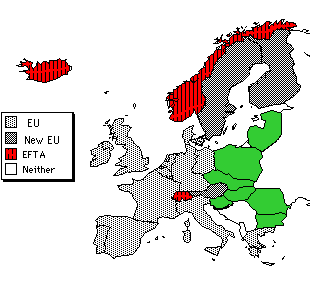 |
| Austria | Ireland | Sweden |
| Britain | Liechtenstein | Switzerland |
| Denmark | Norway | |
| Iceland | Portugal |
|
|
|
The European Free Trade Association was formed in 1959 by Britain as a counter to the then 6 member European Economic Community, the precursor to the European Union, from which Britain had been excluded by failing to join the negotiations that led to the Treaty of Rome. The British government appears to have believed the EEC would fail, and that the Empire and Commonwealth was more important - though already very weak, as shown by the 1956 Suez war. Britain under Harold Macmillan as prime minister applied for membership in 1961 but was refused membership of the EEC by De Gaulle's veto in 1963. EFTA consisted then of Iceland, Norway, Denmark, Portugal and Britain Austria and Switzerland. (Ireland in those days was part of the British monetary area). All have since joined the EU, except Norway, Switzerland and Iceland. Switzerland does not belong to any international organizations, (at that time not even the UN), and voted against EU membership. EFTA had an agreement to trade between members without tariffs but had no central institutions. The other EU members suspect that recent present British governments wished the EU could become more like EFTA and less like a potential federation. This would have the same disadvantages as the proposed North American Free Trade Area seems likely to have: wage levels and social provision falling to the level of the cheapest country, and no environmental controls. This seems to be the policy of recent British governments following American Free Market doctrines. Before British membership of the European Community the Community and EFTA negotiated a treaty on a European Economic Area to regularize relations between them and require the EFTA countries to adopt most of the Community regulations on competition, taxation, health and safety and so on, even though the EFTA countries had no direct influence on the making of the regulations. In return they gained free access to the market of the Community members. The treaty was finally agreed in October 1991 and came into effect on 1 January 1993 (at the same time as the Single Market abolished customs barriers between members of the EU). EFTA became irrelevant after Britain, Ireland and Denmark joined the EEC. Switzerland remains anomalous after voting against the EEA. The voters of Norway refused EU membership again in 1994. Liechtenstein joined the EEA April 1995. Iceland and Norway seemed unlikely to join the EU as long as the Common Fisheries Policy would require them to surrender control over their fishing areas. But in 2009 Iceland's bankruptcy via its banks' unwise speculation, have caused the current government to start negotiations with the EU. Norway does not need membership as it is cushioned by its huge revenues from oil and gas, but nevetheless contributes to EU funds. |

